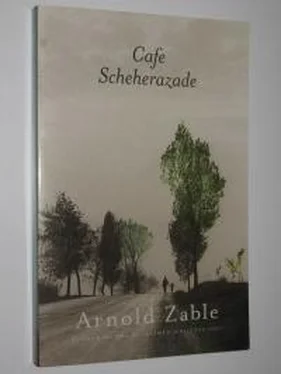Arnold Zable - Cafe Scheherazade
Здесь есть возможность читать онлайн «Arnold Zable - Cafe Scheherazade» весь текст электронной книги совершенно бесплатно (целиком полную версию без сокращений). В некоторых случаях можно слушать аудио, скачать через торрент в формате fb2 и присутствует краткое содержание. Город: Melbourne, Год выпуска: 2001, Издательство: Text Publishing Company, Жанр: Проза, на английском языке. Описание произведения, (предисловие) а так же отзывы посетителей доступны на портале библиотеки ЛибКат.
- Название:Cafe Scheherazade
- Автор:
- Издательство:Text Publishing Company
- Жанр:
- Год:2001
- Город:Melbourne
- ISBN:нет данных
- Рейтинг книги:4 / 5. Голосов: 1
-
Избранное:Добавить в избранное
- Отзывы:
-
Ваша оценка:
- 80
- 1
- 2
- 3
- 4
- 5
Cafe Scheherazade: краткое содержание, описание и аннотация
Предлагаем к чтению аннотацию, описание, краткое содержание или предисловие (зависит от того, что написал сам автор книги «Cafe Scheherazade»). Если вы не нашли необходимую информацию о книге — напишите в комментариях, мы постараемся отыскать её.
Cafe Scheherazade — читать онлайн бесплатно полную книгу (весь текст) целиком
Ниже представлен текст книги, разбитый по страницам. Система сохранения места последней прочитанной страницы, позволяет с удобством читать онлайн бесплатно книгу «Cafe Scheherazade», без необходимости каждый раз заново искать на чём Вы остановились. Поставьте закладку, и сможете в любой момент перейти на страницу, на которой закончили чтение.
Интервал:
Закладка:
The sailors loaded it with freight. Their cargo included a herd of horses. They were led aboard just as we had been, hours earlier. You could see their confusion and fear. We were no different. We were merely animals being shunted about. And our centre of gravity had shifted: away from Poland, Russia, Europe, away from our childhood homes.
"To this day, I no longer have a centre of gravity. I feel rootless. I will always feel rootless. I had been stripped of everything. Of the scent of my youth, my known way of life. And there is a certain advantage in this, a certain freedom. Even today, though I have lived in Melbourne for over fifty years, I have no sense of belonging. I am acutely aware that everything is temporary in life, a mere bridge. One does not build a house on a bridge. Instead I find my true home inside. I escape inside and I can go wherever my fancy takes me.
"You have a taste for champagne, but a pocket only for beer. So the saying goes. But I have enough imagination to make beer taste like champagne. This is the great gift I received. Through losing everything, I became free.
"I no longer care for anthems, and I no longer care even for nations. They too are transient. The truth of who we are lies elsewhere, in the way we order our inner lives as we drift over unknown seas.
"In losing everything, I have come to value everything: to savour this cup of coffee, its warmth, its aroma, to savour my 102 walks by the sea, and this moment with a friend, at a table in
Scheherazade. What more is there? Can you tell me?"
The Japanese freighter weighed anchor towards evening. Fragments of debris floated by. Ice breakers swept the bay. The lights of
Vladivostok blinked as the vessel moved away. Zalman was afraid he would be sick. But the sea was smooth. The gentle rocking of the boat soothed him.
As they headed out into the darkness Zalman descended into the hold. It was divided by aisles that threaded between rows of straw mats. Passengers lay on the mats. Some were lost in sleep.
Others stared at the ceiling. In a dark corner a bearded man, in a black caftan, rocked back and forth in prayer.
Zalman lay down on a mat and fell asleep. He slept deeply. He awoke feeling sick. It was still night. His head ached. His whole body ached. He staggered out onto the deck and vomited. He crawled back onto the straw mat, fell asleep and awoke again, hours later, to a cool sensation on his lips. A fellow passenger was feeding him a slice of apple. He smiled. Zalman has never forgotten that smile or that act of kindness from an older man. A wiser man. Zalman ate the apple and fell back into the darkness.
He awoke again at dawn, and climbed the stairs to the deck. The sea was as smooth as a table. On the horizon he could make out the coastline of Japan. Pine trees rose above distant dunes. The boat floated on a sedate sea. He stood there for hours; he 103 did not know for how long. He had to tear himself away to descend for breakfast.
Zalman returned to the front deck in the late morning. The sun was high. The coast was approaching. He could see forests, fields, wooded hills, a port, and the entrance to a bay. And he thought, "I am entering the land of Madame Butterfly."
The Tsuruga wharf drifted towards him in a tranquil dream. Zalman saw the town, its streets lined with wooden houses the colour of teak. He focused on one house. He saw a door. It slid open and he saw a woman in a kimono. She flitted by on wooden clogs. Then she was gone. But in his imagination she remained a luminous presence, a glimpse of the unknown, a Madame Butterfly.
Zalman yearns for peace of mind, but unresolved questions remain, the feeling that he is still on a journey over which he has long lost control. He returns again and again to the moment when he farewelled his loved ones in Warsaw and fled towards the east.
Somehow it was too hasty. There was not time to stop, to register the last image of his mother, the last words of his father, the final sight of familiar streets. How was he to know that it would be forever? This is what has nagged at him for over fifty years.
His life has been one long journey away from certainty.
And there is something else. Call it a sense of guilt, perhaps.
Call it paradox, an uneasy admission; but there were moments 104 of unexpected elation as he journeyed away from Vilna, moments when he felt an intoxicating surge of freedom. Never was this feeling stronger than on the day he first glimpsed the land of
Madame Butterfly.
On the following morning, at dawn, he was escorted from the freighter onto the wharf and through the deserted streets of
Tsuruga. They walked, a party of three hundred or more, through the sleeping town. They walked along narrow streets lined with rows of wooden houses. Miniature bridges looped over cement ditches to the entrance of each dwelling. A lone woman swept the street in front of a store. Two fishermen trudged to the beach front, their nets draped over their backs. Behind the town loomed hills over which the sun had yet to rise.
Their lives were in the hands of customs officers and railwaymen, of Japanese authorities and Jewish relief workers who directed them through the gates of the station. They marched to the end of a platform and, exactly on time, to the very minute, the train arrived.
The doors opened. The refugees filed in and sat down, each one on a seat of their own. This is what struck Zalman, the efficiency, the precision, the politeness; and cleanliness. More than ever he felt as though he was moving in a dream.
The train crawled over mountain passes. Zalman caught glimpses of cascading waterfalls and gorges. He saw pines bent back by centuries of wind. He saw fields criss-crossed with flooded paddies. Peasants stood in the fields, dressed in high boots, colourful blouses and pyjama-style pants. He saw 105 women with white headscarves and sashes tied around their waists.
He glimpsed clusters of cottages, their tiled roofs cast in mauve and turquoise tints. He saw the ruins of a castle, the lush gardens of a villa. He caught sight of wooden temples, and pilgrims gathered about a shrine.
The train approached industrial complexes smudged with smoke.
Open fields gave way to city thoroughfares and milling crowds.
The train slowed to a halt, the doors parted. The refugees filed out. They were met on the platform by relief workers who escorted them out of the station and through the streets of Kobe.
They walked under a winter sun, stateless men and women in transit. They walked exposed to its glare, unaccustomed to the light, their eyes blinking. They walked in their crumpled clothes, the shabby suits they had worn since they left Vilna.
Among them walked yeshiva boys in black pants, white shirts and narrow-brimmed hats, clutching prayer books wrapped in embroidered bags. Beside them walked rabbis clad in black satin coats, and a scattering of children, the girls in head kerchiefs and frayed dresses, the boys in knickerbockers and worn jackets.
The children moved hand-in-hand with self-appointed guardians, or with their mothers and fathers, those numbered few with families intact.
Mostly they were single men who, like Zalman, could not erase the faces of dear ones. These were the images that plagued their minds as they ascended a steep incline. Below them, coming into view, was yet another harbour. The vista expanded as they 106 climbed. The harbour was crowded with gunboats and freighters.
The Bay glowed under a sheen of silver. The strip of foreshore extended inland, several hundred metres flat, before ascending into the hills up which they trudged. They moved past houses flying the flags of France and Britain, of Switzerland, Denmark and Norway. They were in the international quarters, among the homes of merchants and diplomats, wealthy traders and shipping agents.
Читать дальшеИнтервал:
Закладка:
Похожие книги на «Cafe Scheherazade»
Представляем Вашему вниманию похожие книги на «Cafe Scheherazade» списком для выбора. Мы отобрали схожую по названию и смыслу литературу в надежде предоставить читателям больше вариантов отыскать новые, интересные, ещё непрочитанные произведения.
Обсуждение, отзывы о книге «Cafe Scheherazade» и просто собственные мнения читателей. Оставьте ваши комментарии, напишите, что Вы думаете о произведении, его смысле или главных героях. Укажите что конкретно понравилось, а что нет, и почему Вы так считаете.












